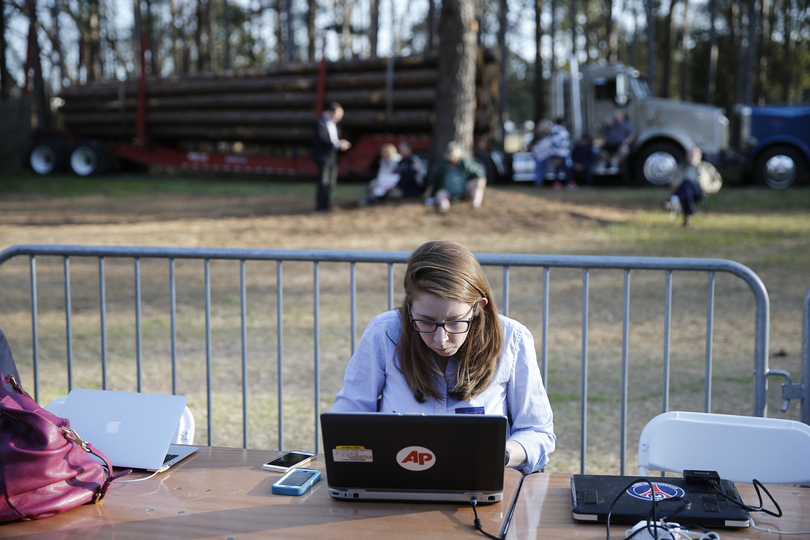Newsmakers: Kathleen Ronayne covers Ohio Gov. John Kasich in New Hampshire

Courtesy of Matt Rourke
Kathleen Ronayne ('12) has spent the past few months covering Ohio Gov. John Kasich on the presidential campaign trail.
About a week before the polls opened in the New Hampshire primary, Associated Press reporter Kathleen Ronayne was sitting across from Ohio Gov. John Kasich on his campaign bus.
As the bus moved, Ronayne had his undivided attention for 30 minutes.
That was a different interaction than what Ronayne was used to with Kasich, who would go on to finish second in the primary. Usually, she said, reporters are part of a free-for-all media scrum, in which 15 or more people shove microphones or recorders in a candidate’s face.
But this time, Ronayne had time to build rapport with Kasich outside of the fast-paced, “fly by the seat of your pants” environment of a presidential campaign.
“One of the most interesting things we talked about is that Kasich is unique from other candidates in that he doesn’t deliver the same speech all the time,” she said. “He definitely has anecdotes he uses over and over, but he kind of switches things up. You never know exactly what he’s going to do.”
Ronayne (‘12) began her career at The Daily Orange in the news department, and then went on to serve as managing editor. Before joining the AP in 2014, she worked at The Concord Monitor, covering the New Hampshire state Legislature.
In the weeks leading up to the primary, Ronayne was instrumental in the AP’s coverage of Kasich. She attended every Kasich campaign event in New Hampshire, followed him around the state and talked to voters.
Presidential candidates first started visiting New Hampshire about one year before the actual primary, and that’s when the AP assigned Ronayne to cover the race.
“They’re going to diners, showing up at town hall meetings,” Ronayne said. “They’re showing up at local organizing committees, because they know they really have to engage directly with the people of New Hampshire.”
Ronayne described her role as that of a “pinch hitter,” meaning she covered candidates and events not being written about by AP national political reporters.
Then, about two or three weeks out from the primary, Ronayne suggested that she cover Kasich, who was gaining momentum in the race. He became her candidate.
Despite being so immersed in the campaigns, Ronayne said she was often surprised by the way they turned out.
At one point, she thought New Jersey Gov. Chris Christie might win — or at least come in second. A lot of people did, she said.
But in just a short amount of time, Christie’s chances dwindled. When the results came in on Feb. 9, Christie finished sixth. He dropped out of the race the day after.
“To be honest, I had no idea what was going to happen, even being up close,” Ronayne said. “This is such a strange election cycle.”
After Kasich came in second, he moved on to South Carolina. His campaign set up a press plane to follow him, but the AP didn’t book a spot. Ronayne thought her job was done.
“I was bummed I wasn’t on that plane,” she said.
At about 11 p.m the night of the New Hampshire primary, Ronayne got a call from her boss in Washington, D.C.
“How soon can you get on a plane to South Carolina?” Ronayne recalled her boss saying. “Go home and pack. You’re following John Kasich.”
She drove home that night; found a flight; packed; slept for about two hours; got up at at about 4 a.m.; and went to the airport. By noon, she was in South Carolina, following Kasich — who would go on to finish fifth in that state’s primary and decide to remain in the race — once again.




